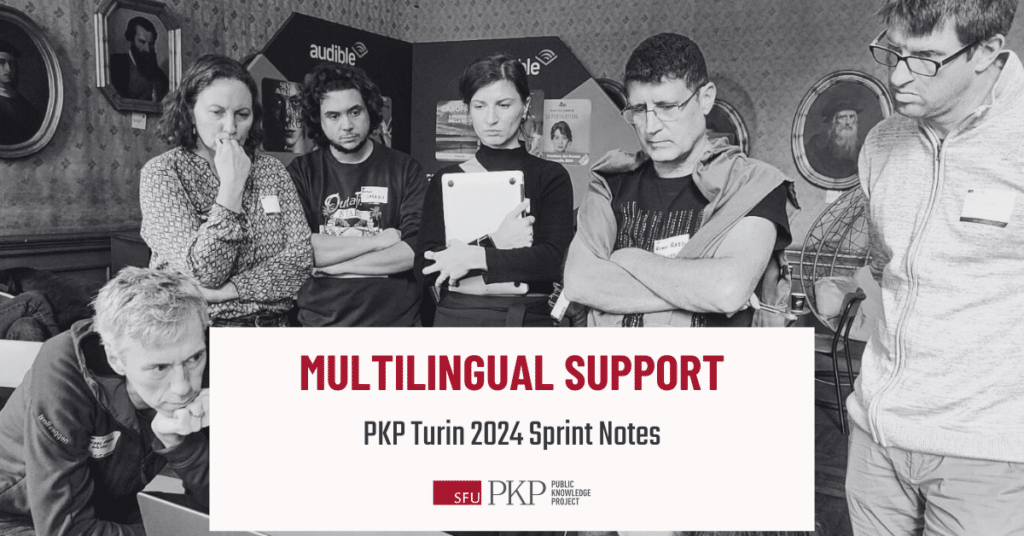
The Multilingual Support summary from the PKP Turin Sprint, hosted by the CRAFT-OA project in October 2024, is now available.
Sprints involve PKP community members joining diverse groups to work on PKP software and support. In October, the CRAFT-OA project and the University of Turin hosted eight working groups at the PKP Turin Sprint. This is a summary of one such group’s work.
Abstract
OJS supports multiple languages, but improvements are needed to enhance accessibility and usability for multilingual users. Key goals of this working group include exploring Weblate for translations, developing a workflow for regional translation teams, and updating PKP’s translation guide. One major issue highlighted is the incorrect designation of contributors as “authors” in metadata, requiring schema adjustments. Future steps involve refining workflows and updating PKP documentation to support regional translation initiatives.
Working Group members
- Gennaro Razzi, Archimede Informatica
- Karl Magnus Nilsen, UiT The Arctic University of Norway
- Ramana Fragola, Kungliga biblioteket
- Denis Maier, University Library Bern
- Alejandra Casas Niño de Rivera, Public Knowledge Project
- Renate Voget, hbz | openaccess.nrw
Background
Many OJS installations use multiple languages, and the system must be accessible and understandable to users in different contexts. The current treatment of multilingualism (and some other areas, see below) presents a number of challenges, issues, and bugs that we would like to see improved in future versions.
PKP’s UX/UI Designer, Devika Goel, demonstrated a preview of upcoming changes in multilingual forms in 3.5. The group saw that the new version addresses some of the issues below and the community will test such enhancements.
Some group members show interest in contributing to software and documentation translation and forming new Italian subgroups for both purposes.
Goals
- Highlight some areas for potential future development and better understand which of these may be implemented in 3.5.
- Learn more about how to use Weblate for translation work.
- Define a workflow for the creation of regional or language-based translation groups
Results
- A problem we identified: if a contributor is marked as a translator in the metadata, in the Crossref XML exported for the article, they are still identified as “author”. The correct role information should be passed on to Crossref according to the Crossref standard. See https://community.crossref.org/t/clarification-around-contributor-roles-notably-editor-vs-reader-vs-reviewer/6800 and https://data.crossref.org/reports/help/schema_doc/5.3.1/crossref5_3_1_xsd.html#contributor.atts_contribuor_role (according to the schema, there should be dedicated attribute values for different roles).
The community identified this bug back in 2020. https://data.crossref.org/reports/help/schema_doc/5.3.1/crossref5_3_1_xsd.html#contributor.atts_contributor_role - Adding a chapter to the PKP translation guide https://docs.pkp.sfu.ca/translating-guide/en/ about group translations of the software for future groups in different regions and languages.
- Creating the group
- Check if there are existing Regional networks on the PKP Community Forum
- In case the Regional Network exists, connect with the community through the forum
- In case the Regional Network doesn’t exist, publish a post on the Community Showcase Forum
- Define the moderator(s) of the group
- Moderation tasks
- Liaison PKP – contacting PKP translation Coordinator,
- Organizing meetings, Sprints, and regular activities
- Onboarding of new members
- Moderation tasks
- Define Glossary and Style Guide
- i.e. Spanish DIG glossary and Style Guide
- Setting up the environment for the group to work on Weblate
*Explore Weblate’s voting feature. - TRANSLATE!!!!
- Finally, the Moderator will let the PKP translation Coordinator know the translations are ready to implement
Next Steps
- Review the proposed workflow
- Send the proposal to PKP’s translation Coordinator
- Ask the DIG to expand documentation and add the chapter to the PKP translating Guide
Thank you
We once again thank the Sprint host institutions, and all participants for their valuable contributions to the PKP user community. Special thanks to the CRAFT-OA Project and University of Turin for their support and partnerships.
